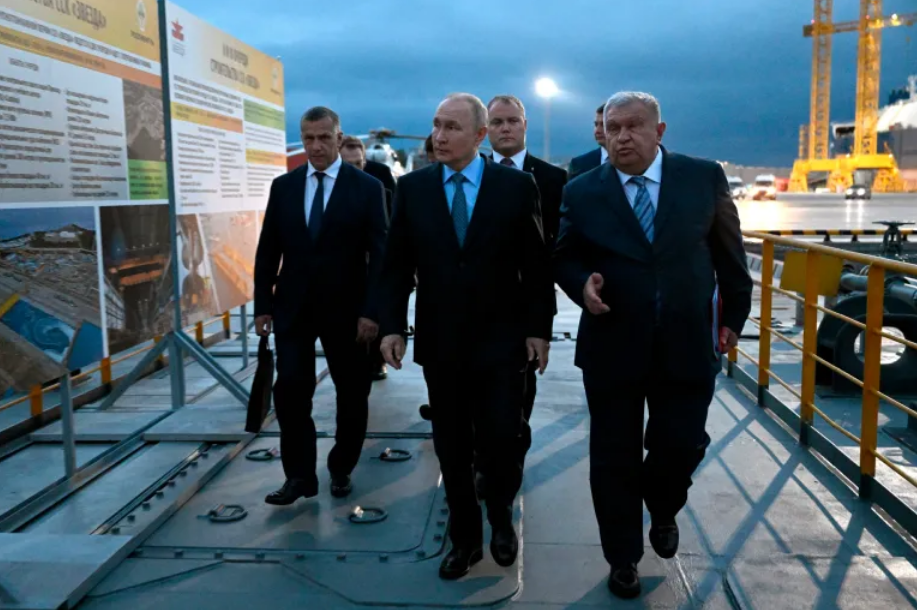Russia has proven surprisingly resilient in the face of sanctions targeting its oil and gas industry, but that resilience may not last long as Moscow has yet to find a profitable market for its fuel like Europe and it also lacks some key technologies for the sector, experts with S&P Global said.
“Consolation prize”
“When you look at the different subsectors of the Russian oil and gas industry, you see the level of difficulty that the industry is facing,” said Craig Kennedy, an expert at the Davis Center for Russia and Eurasia Studies at Harvard University, during a webinar hosted by the Center for the National Interest (based in Washington DC, USA) on April 26.
Over the past 25 years, major refineries in Russia have installed a lot of advanced equipment from Western suppliers, but due to sanctions, they can no longer get spare parts or maintenance services, leading to infrastructure degradation, Mr. Kennedy said.
In the gas sector, Russia is negotiating to build a major new pipeline to China, but neither Moscow nor Beijing has the compressor technology to operate such a pipeline, Kennedy said. That project would also require a major investment that state-owned gas giant Gazprom cannot afford right now, he added.

Russian President Vladimir Putin and Rosneft CEO Igor Sechin visit the Zvezda shipbuilding complex in Russia's Far East Primorsky region, September 11, 2023. Photo: AP/Al Jazeera
As a gas market, Europe offers Russia what Asia cannot: high gas prices, low transportation costs, and private equity-based financing, according to the Harvard expert.
“The reason Russia has stuck with Europe for so long is because they got a good deal there. Asia is really just a consolation prize,” Mr. Kennedy said.
The new supply-demand picture is likely to remain in place for years to come, with Russia looking east and south for customers and Europe looking west for supplies.
Tatiana Mitrova, a researcher at the Global Energy Center at Columbia University, believes that in the next few years, the Russian oil and gas industry will not face serious problems, but over time, technological problems will accumulate and at a certain point, it will lead to some more painful consequences.
In the short term, Russia may be innovative by taking gas compressors from pipeline projects that once served Europe and repurposing them for projects serving China. “Don’t underestimate the creative thinking of Russian companies that are cornered,” Mitrova said.
Increasing difficulty
In addition, liquid cargo ships are also a barrier for Russia, Mr. Kennedy noted. Before the conflict in Ukraine, Russia was able to transport about 15% of its oil by sea, while the rest was mainly transported via liquid cargo ships owned by the EU or insured by Western carriers.
After sanctions, Russia turned to the secondhand market and spent billions of dollars building a “shadow fleet” to avoid the oil price cap, but it still operates at less than 50% of its capacity, Kennedy pointed out. And the ships in the “shadow fleet” have an average lifespan of 18 years, which means they will need to be replaced in the next few years.
“Yes, Russia is still responding, but the overall trajectory is one of an industry facing increasing levels of difficulty,” said Mr. Kennedy.

A crude oil tanker drifts at night at sea. Photo: Euronews
Paul Saunders, head of the Center for the National Interest, argues that Russia has largely succeeded in redirecting its oil flows. Moscow has also successfully rerouted its coal exports, although the sector – largely privatized – faces huge economic pressure from higher taxes and higher rail tariffs.
The Russian economy is certainly not collapsing, Saunders said. That means that attempts to exert political pressure on Russia through economic pressure on the energy sector will not succeed, and the West may need to come up with some new ideas “if that’s what we want to do in the future,” he said.
According to experts at the Energy Intelligence consulting network, Russian President Vladimir Putin knows that any attempt by Washington to prevent Moscow from exporting oil will push up prices and jeopardize US President Joe Biden's chances of re-election in the race for the White House in November.
So at best – at least in oil trading – the status quo will prevail this year as fighting in Ukraine drags on, experts conclude .
Minh Duc (According to S&P Global, Energy Intelligence)
Source



































































































Comment (0)